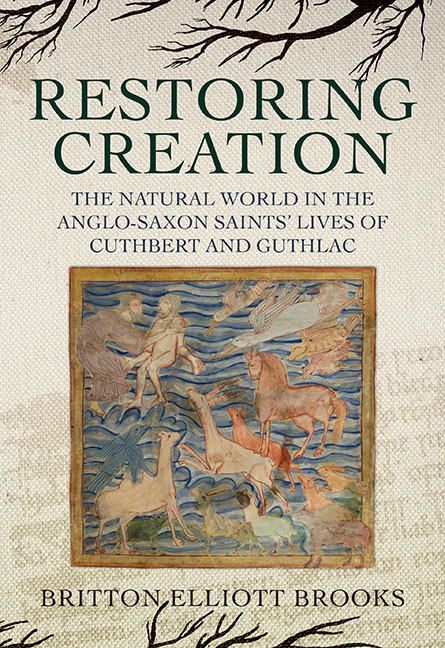 Restoring Creation: The Natural World in the Anglo-Saxon Saints' Lives of Cuthbert and Guthlac
Restoring Creation: The Natural World in the Anglo-Saxon Saints' Lives of Cuthbert and Guthlac Book contents
- Frontmatter
- Contents
- Acknowledgements
- Abbreviations
- Introduction
- 1 Monastic Obedience and Prelapsarian Cosmography: The Anonymous Vita Sancti Cuthberti
- 2 Ruminative Poetry and the Divine Office: Bede's Metrical Vita Sancti Cuthberti
- 3 Bede's Exegesis and Developmental Sanctity: The Prose Vita Sancti Cuthberti
- 4 Enargaeic Landscapes and Spiritual Progression: Felix's Vita Sancti Guthlaci
- 5 Landscape Lexis and Creation Restored: The Old English Prose Life of Guthlac and Guthlac A
- Conclusion: Afterlives of Cuthbert and Guthlac
- Bibliography
- Index
3 - Bede's Exegesis and Developmental Sanctity: The Prose Vita Sancti Cuthberti
Published online by Cambridge University Press: 18 September 2019
- Frontmatter
- Contents
- Acknowledgements
- Abbreviations
- Introduction
- 1 Monastic Obedience and Prelapsarian Cosmography: The Anonymous Vita Sancti Cuthberti
- 2 Ruminative Poetry and the Divine Office: Bede's Metrical Vita Sancti Cuthberti
- 3 Bede's Exegesis and Developmental Sanctity: The Prose Vita Sancti Cuthberti
- 4 Enargaeic Landscapes and Spiritual Progression: Felix's Vita Sancti Guthlaci
- 5 Landscape Lexis and Creation Restored: The Old English Prose Life of Guthlac and Guthlac A
- Conclusion: Afterlives of Cuthbert and Guthlac
- Bibliography
- Index
Summary
MORE THAN TWENTY years after completing the VCM, sometime near 721, Bede returned to Cuthbert with his prose Vita Sancti Cuthberti (VCP). This return seems, at first, paradoxical: Bede's VCM was composed as the poetic companion piece to the VCA, in the opus geminatum tradition, and its completion signalled the conclusion of the unit. Scholars have long debated Bede's intentions in composing another (prose) life of Cuthbert. The most widely accepted view, synthesised by Thacker, is that Bede's alterations to his source material from the VCA stemmed from his desire for ecclesial reform. This argument is supported by Bede's use of Cuthbertine material in the Historia which, in Thacker's words, places the Cuthbert of the VCP as the conclusion to and ‘finest fruit’ of ‘the conversion initiated by Gregory the Great’. Bede returns a third time to the life of Cuthbert in his Historia, inserting select stories as the conclusion to Book IV. This placement of Cuthbertine material highlights Bede's lifelong fascination with the saint, as well as providing evidence for his refashioning of Cuthbert as a saint with wide appeal. Bede's adaptation of Cuthbertine material in the VCP and Historia transforms the relationship between Cuthbert and Creation, from the model of static sanctity presented in the VCA and VCM into a developmental sanctity that ultimately leads to the restoration of select portions of Creation. Bede's particular conception of the sanctity towards which Cuthbert is journeying is firmly fixed in a Gregorian form of monasticism, but is augmented with a model of spiritual progression based on the Evagrian Vita Antonii. The movement towards an idealised Gregorian monk-pastor as saint is framed as a progression within the Antonian model, whereby Cuthbert's transition from ascetic to cenobite, and eventually bishop, is based upon individual moments of spiritual progression. Bede combines this saintly process in the VCP with his clearly didactic purpose for the work, which seeks to interpret and provide exegesis for the events in Cuthbert's life, as well as to highlight Cuthbert's pastoral excellence and subsequent emulative behaviour. Bede presents Cuthbert primarily as a reformer who transforms the already Christian into something more holy.
- Type
- Chapter
- Information
- Restoring Creation: The Natural World in the Anglo-Saxon Saints' Lives of Cuthbert and GuthlacThe Natural World in the Anglo-Saxon Saints’ Lives of Cuthbert and Guthlac, pp. 123 - 172Publisher: Boydell & BrewerPrint publication year: 2019


